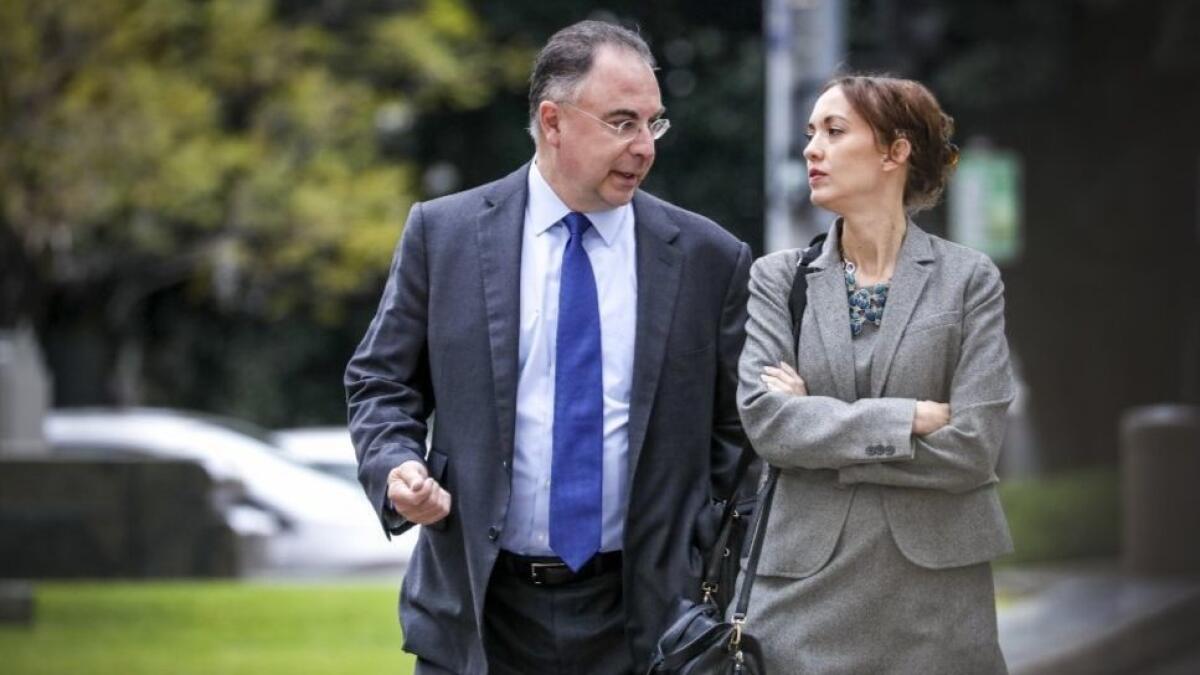Before the double-dealing allegations, there were red flags over $30-million DWP contract

The head of the Los Angeles Department of Water and Power’s contracting division was concerned: Top DWP executives wanted to give a $30-million, no-bid contract to a new consulting company to fix the utility’s billing system.
In a memo dated June 5, 2017, Gwendolyn Williams, the division head, wrote that the consultant’s rates — $400 a hour on average — would be significantly higher than those of other companies.
The next day, the DWP commission, appointees of Mayor Eric Garcetti, met and approved the contract with Aventador Utility Solutions, which at the time was owned by Paul Paradis, an attorney working for L.A. City Atty. Mike Feuer.
Williams’ memo and other internal DWP documents obtained by The Times show that high-level department staff had serious issues with the contract with Aventador. The documents show the agreement was questioned two years before a Superior Court judge ordered an investigation of payments to Paradis and other attorneys for their work stemming from the disastrous 2013 rollout of the DWP’s new billing program.
Paradis’ attorney didn’t respond to a request for comment. Rob Wilcox, a spokesman for Feuer, said the city attorney’s office had signed off on the contract “as to form and legality — not as to substance, as is our role and practice.”
DWP spokesman Joe Ramallo said Aventador’s rates were fair and reasonable. Asked why the DWP sought the contract after executives received Williams’ memo, he referred The Times to the utility’s letter to the board for the agreement, which cited a court mandate to fix the billing system.
The court is investigating whether attorneys worked both sides of the deal and benefited financially from the city’s settlement of a class-action lawsuit brought by ratepayers over the billing errors.
The DWP documents raise new questions about how Paradis, a 56-year-old New York litigator with a background in consumer lawsuits, was able to secure a lucrative no-bid deal with the nation’s largest public utility.
In recent months, elected officials have demanded answers about Paradis. In May, City Councilwoman Nury Martinez held a closed-door meeting with DWP General Manager David Wright and the city’s lawyers about the Aventador contract and the controversy surrounding the settlement.
City Controller Ron Galperin’s office is also investigating the contract, spokesman Ian Thompson confirmed.
Alleged conflicts of interest
The DWP launched its new billing software system in 2013, the year Garcetti became mayor. The rollout was a debacle, with hundreds of thousands of customers overcharged. The chaos prompted widespread outrage and promises by the DWP to fix the problems.
Ratepayers filed a class-action lawsuit against the utility over the incorrect bills and eventually secured a $67-million settlement. The city, in turn, sued PricewaterhouseCoopers, the consulting firm that implemented the billing software.
Feuer’s office retained Paradis to work as special counsel in the city’s lawsuit against PricewaterhouseCoopers. Paradis also attended mediations in the ratepayers’ lawsuit against the city, a city attorney’s office spokesman said.
While seeking city records to defend itself, PricewaterhouseCoopers uncovered evidence that Paradis represented the lead plaintiff who later filed the ratepayers’ class-action lawsuit — DWP customer and Van Nuys resident Antwon Jones, according to court testimony.
But Paradis never disclosed that relationship to the court during settlement proceedings, according to PricewaterhouseCoopers. Jones testified in his deposition that he thought Paradis was one of his attorneys in his case against the city up through the lawsuit’s settlement in July 2017.
PricewaterhouseCoopers accused Paradis of having a massive conflict of interest.
In court documents, the company argues that Paradis’ actions were part of a broader scheme: He and the city worked together to select the plaintiff and attorney who brought the class-action lawsuit against the DWP in an effort to get a more favorable settlement for the utility.
Several lawsuits were filed against the city over the billing system. PricewaterhouseCoopers alleges in court documents that the city chose to settle with Jones, who hasn’t been accused of wrongdoing, so they could control the outcome of the settlement and avoid scrutiny of the DWP billing system.
Feuer’s office in a statement cast blame on Paradis and Paul Kiesel, a Beverly Hills attorney also hired by Feuer’s office to work on the PricewaterhouseCoopers case. Kiesel, meanwhile, testified in a deposition that the city attorney’s office wanted the Jones lawsuit brought against it so it could settle several other legal claims, which Feuer’s office denies.
Last month, Los Angeles Superior Court Judge Elihu M. Berle appointed Edward M. Robbins, a former federal prosecutor, to investigate the settlement, the consulting contracts and payments made to attorneys.
Berle said at a hearing earlier this year that PricewaterhouseCoopers “has presented sufficient evidence to establish a prima facie case of fraud by the city and its counsel.”
Justifying ‘fair and reasonable’
During Paradis’ deposition earlier this year, he invoked his 5th Amendment right against self-incrimination on nearly every question asked by PricewaterhouseCoopers, according to court transcripts.
Emails and public filings show how the contract took shape.
In March 2017, Paradis registered Aventador as a Santa Monica-based consulting company with the California secretary of state’s office, according to the agency’s website.
Weeks later and prior to the June 6 board meeting, Donna Stevener, the DWP’s chief administrative officer, emailed the utility’s contracting division about the proposed contract with the then-newly formed company.
“Dave [Wright] has obtained concurrence from the board to sole source a contract with Paul Paradis for 3 years to finish the [billing] settlement related activities,” Stevener wrote in an email obtained by The Times. She added that Wright wanted to take it to the board in June.
Ramallo said DWP board President Mel Levine and Wright frequently discussed issues coming before the commissioners.
Williams, then the head of the utility’s contracting division, helped oversee billions of dollars’ worth of agreements at the DWP, and formerly worked on contracts at Metropolitan Transportation Authority.
In a June 1, 2017, email to Wright and Stevener, she voiced concern about Aventador’s high rates. And in a follow-up memo, she listed the hourly rates of consulting firms that recently had won contracts, including Oracle, whose average hourly rate was less than $200.
Aventador’s average rate was $400, with Paradis charging $475 an hour as a project director. Aventador’s “rates are significantly higher than the contracts listed above,” Williams wrote.
Also, some of Aventador’s workers indicated they planned to work nearly full-time at a high hourly rate, Williams wrote. By contrast, other consulting firms typically charged high rates on an as-needed or project-management basis, according to the memo, thus lowering the overall costs to the DWP.
“Without further analysis or audit, I am unable to determine that the type of work being performed is of such a nature to justify the ‘fairness’ and ‘reasonableness’ of these rates,” she wrote.
The DWP’s proposed contracts are supposed to include a statement that the recommended price has been determined to be fair and reasonable, according to an internal document obtained by The Times.
Williams, who retired last year from the DWP, declined a request for an interview.
Contract approved — and then canceled
DWP commissioners approved the Aventador contract on June 6, 2017. At the meeting, Wright said the terms of the Jones settlement required the utility to fix its billing system, and seeking bids for that work would take too long.
Wright didn’t return a call seeking comment. Garcetti’s office announced last month that he would step down as general manager on Oct. 1.
DWP spokesman Ramallo said Stevener did her own analysis of companies’ rates after she received Williams’ memo. Aventador’s rates were “comparable and fair for the services being provided,” he said. Ramallo provided The Times with the data Stevener used. It showed Aventador’s rates were higher in nearly every job classification than six other companies, with the exception of a law firm.
In court documents, PricewaterhouseCoopers questioned the Aventador contract, saying the city put a plan to fix its billing system into the Jones settlement for “which there was no discernible reason or request by plaintiffs.”
Levine did not recall seeing Williams’ memo before the vote, but supported the contract because of the court-mandated timelines for compliance with the settlement agreement, Ramallo said.
Aura Vasquez, a former DWP commissioner who voted to approve the Aventador contract, said Wright was “irresponsible” for not heeding Williams’ advice.
“At the end of the day, the $30 million comes out of the ratepayers’ pockets,” said Vasquez, who is running for City Council in a district stretching from Koreatown to Crenshaw Boulevard.
DWP commissioners voted earlier this year to cancel the Aventador contact amid questions about Paradis. More than $20 million had already been paid out, however.
Paradis sold Aventador in March to one of his employees, who renamed the company Ardent Cyber Solutions, according to court documents. The DWP signed a contract with Ardent in April for cybersecurity work.
Twitter: @dakotacdsmith
More to Read
Sign up for Essential California
The most important California stories and recommendations in your inbox every morning.
You may occasionally receive promotional content from the Los Angeles Times.











